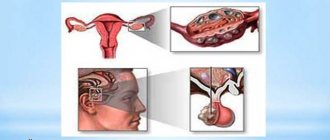Irregular periods are one of the main symptoms of diseases of the female genital organs. To choose the appropriate treatment, the doctor will need to determine the cause of the disorder. For minor deviations, vitamins are recommended to normalize the menstrual cycle. Vitamins of group B, as well as A, C, E, are successfully used. In the absence of serious pathologies, the cycle is restored within up to three months.
Can vitamins affect periods?
In women with a healthy reproductive system, menstruation lasts from 3 to 7 days, the cycle length varies between 21-35 days. Systematic deviations from the norm can be a signal of hormonal imbalance, the development of diseases of the genital organs, and a lack of minerals. Hormonal and psychotropic drugs can also cause disturbances.
With a lack of biologically active substances, ovulation may slow down. To compensate for their deficiency, special supplements and therapeutic diets are prescribed.
How does vitamin therapy work by day of the cycle?
To correct unstable periodic bleeding, vitamin therapy according to the phases of the cycle is used in the second half of menstruation. From the moment they begin, the woman counts fifteen days and for 10 days drinks vitamins prescribed by the doctor according to the days of the cycle. After this, a break until the next menstruation, and so on for several periods in a row, until cyclic vitamin therapy for cycle disorders takes effect.
With the judicious use of various bioactive substances and trace elements for the treatment of irregular periods, side effects are rare. However, it is worth considering that vitamins for regulating the menstrual cycle are biological catalysts and should be used carefully. The most common side effects include:
- allergic reaction;
- disruptions in the digestive system;
- skin pigmentation.
How to normalize your cycle with vitamins
Biologically active substances play an important role in stimulating hormone production. According to research results, some of them affect the functioning of the reproductive organs. Therefore, doctors often prescribe vitamins to restore the menstrual cycle.
If a woman has minor cycle irregularities, the doctor may prescribe supplementation in phases. The duration of treatment is 2-3 months. If after this period no positive dynamics are observed, hormonal therapy may be required.
What are the causes of cycle failures?
| Cause | Why is this happening |
| Endometriosis | The frequency of this pathology is steadily increasing every day. Its cause and the mechanism of development are not fully understood, therefore there is no radical treatment. Endometriosis can be localized in any part of the reproductive system and even beyond. In addition to pain, constant spotting before and after menstruation, a woman may be bothered by various cycle disruptions. |
| Imbalance of sex hormones | It can be either hereditary or acquired. There is either an excess of female or male sex hormones. In the first case, heavy and prolonged menstruation with long breaks is characteristic. With hyperandrogenemia, the cycle can be shortened or lengthened, and the amount of discharge is often scanty. |
| Polycystic syndrome | As a result of disruption of the formation of sex hormones, not only disruptions of the menstrual cycle occur, but the ovaries themselves acquire a dense tunica albuginea, which closes the pathological circle. PCOS can manifest as minor cycle disruptions or absence of menstruation for up to six months or more. |
| Other hormonal causes | Disruption of the hypothalamic-pituitary-adrenal-ovarian system, no matter at what level, also leads to menstrual irregularities. This may be hyperprolactinemia or insufficient production of gonadotropic hormones. |
| Ovarian cyst | Ovarian cysts also lead to an imbalance of sex hormones, mostly causing delayed menstruation. |
| Pathology of the thyroid gland | Both hypo- and hyperfunction affect the functioning of the ovaries, disrupting the production of sex hormones. |
| Excess weight is a source of estrogen | This is why women with extra pounds often suffer from all kinds of bleeding, endometrial hyperplasia and uterine fibroids. And changes in the menstrual cycle occur according to the type of functional delays. |
| Psycho-emotional experiences | A woman’s genital organs, ovary and brain structures are more sensitive to all kinds of experiences and stress than they might actually think. This leads to a breakdown of all existing relationships. The result is menstrual irregularities. |
| Climate change, stress | Climate change, like stress, affects menstruation and ovulation. Especially if these are sudden moves - “from cold to warm,” for example. |
| Excessive physical activity | Excessive physical activity leads to constant fluctuations in body weight. Also, some women are addicted to steroid hormones. This all affects the function of the ovaries. |
Among the main causes of menstrual irregularities are:
- endometriosis;
- cystic formations;
- endocrine disorders;
- obesity;
- nervous tension;
- hard labour;
- climate change.
The main causes of menstruation failures are listed in the table.
| Frequency of occurrence in women, % | Causes of failure of periodic bleeding | |||
| Hormonal disorders | Overweight | Nervous overstrain | Chronic diseases | |
| 81 | 32 | 54 | 45 | |
The menstrual cycle of women is very labile, and even minor changes in the external environment or some diseases can lead to disruption. Disorders may appear only in one month or be constantly present in the body. If the reasons are temporary, then it is easier to correct the cycle without using hormonal drugs.
This is the most common reason and cannot always be easily corrected. Disturbances in the hormonal profile can occur at any age, but during the period of formation of menstrual function and in the premenopausal period they occur more often.
Disorders also occur 2–3 years before menopause. These can be both functional reasons and organic ones, for example, a cyst on the ovary. In most cases, menstruation becomes heavy, often with clots.
Hyperestrogenemia
A woman's menstrual cycle directly depends on the level of sex hormones in the blood. An increase in the amount of estrogen can cause disruptions; more often, the interval between critical days lengthens. Adipose tissue is the source of these hormones. It doesn’t matter in which area its excess deposition occurs - on the hips, in the abdomen, etc.
Also, a sharp gain in body weight will lead to similar changes, and rapid weight loss will be expressed in a lack of hormones to which the body is already accustomed. Therefore, some time will also be needed to restore full functions.
Climate change
Many women note disruptions in the menstrual cycle even when the seasons of the year change, most often summer-autumn. This is primarily due to a decrease in daylight hours, as well as colder temperatures. It has been noticed that moving even for a short period to “warm countries”, especially with a sudden move, for example, on New Year or Christmas, when we are in the middle of winter, can cause a delay or, conversely, a premature onset of menstrual periods.
Medications can also affect the cycle, especially if it is stimulated to increase the chances of pregnancy or during the IVF process. After unsuccessful attempts, the cycle may take a long time to be re-established.
Stress
Paradoxical as it may seem, “all diseases come from nerves.” The time of onset of menstruation depends on the level of FSH, LH and some other active substances that are produced in special structures of the brain - the pituitary gland and hypothalamus. They are the “conductors” of the functioning of many organs, including the genitals.
Constant overload, stress, worries, fixation on something cause a disruption in the transmission of nerve impulses, as a result of which the hypothalamic-pituitary-ovarian connection is disrupted. Hence the disruption of the menstrual cycle. In such situations, it is highly likely that menstruation can be normalized without hormones.
The state of the reproductive system largely depends on the functioning of other organs. The activity of the thyroid gland plays an important role. Often with hypothyroidism, changes in the ovaries with cycle disruption are observed.
The adrenal glands are involved in the synthesis of male sex hormones. Their functional disorders, hyperplasia, tumors cause an imbalance in the woman’s body and an increase in androgens. This leads to such manifestations as excess hair on the face, inner thighs, etc. In 70% of cases, various disruptions of the menstrual cycle occur: periods become irregular, heavy, often with clots, polyps in the uterine cavity are not uncommon, etc.
Today it is not difficult to find a woman who notes a constant or periodic increase in blood pressure. If the therapy chosen is inadequate, and there is also weakness of the vascular wall, clinically this can manifest itself in irregular spotting, especially during crises.
A special place is occupied by hormone-dependent tumors, for example, in the ovaries, thyroid gland, etc. By releasing an additional portion of estrogens and other substances, diseases provoke menstrual irregularities.
Sometimes cycle disruption is associated with organic pathology in the uterine cavity, for example, polyps or endometrial hyperplasia, uterine fibroids, especially with submucous growth. Therefore, in case of any dysfunctions, you should initially undergo examination by a doctor.
Dietary supplement for normalizing the menstrual cycle
To achieve good results, you should correctly combine vitamins for menstruation in women. Ready-made dietary supplements containing a complex of substances to normalize the menstrual cycle are available for sale.
The drug Cyclovita includes two drugs intended for use in different phases. The additive contains:
- vitamins B, E;
- ascorbic acid;
- routine;
- iodine;
- selenium;
- manganese;
- lutein;
- folic acid.
This non-hormonal remedy is used for a 3-month course. The drug normalizes the menstrual cycle, reduces soreness of the mammary glands, restores the psycho-emotional background and promotes a general improvement in well-being.
Another supplement containing vitamins for menstrual irregularities is Pregnoton. Available in sachet form for preparing an infusion. The product is often used in preparation for pregnancy and to normalize hormone production. It includes:
- L-arginine;
- vitamins B, C, E;
- magnesium;
- iodine;
- selenium;
- Vitex extract.
This supplement supports the health of the reproductive organs, ensures the normalization of the menstrual cycle, and replenishes the supply of minerals necessary for the development of the fetus. Pregnoton is contraindicated during pregnancy and breastfeeding.
Important vitamins for women's health
Organic substance deficiency and menstrual irregularities are directly related to each other. The lack of elements necessary for the full functioning of the body leads to a weakening of the immune system and a slowdown of all metabolic processes .
This provokes numerous malfunctions in the functioning of various systems and organs, as well as hormonal imbalance and subsequent destabilization of the menstrual cycle. To avoid this, it is necessary to consume a sufficient amount of organic substances to maintain women's health.
Vitamin A
Retinol is one of the main elements that helps normalize the menstrual cycle. It acts in several directions at once:
- strengthens mucous tissues, promoting the growth of their cells;
- prevents the appearance of malignant tumors;
- stimulates the production of progesterone, a sex hormone, the effect of which is especially significant in the second half of the cycle (its deficiency makes periods heavy and irregular);
- improves vision.
But Retinol also improves a woman’s health in general , so taking it will definitely be beneficial.
Group B
Girls who want to regulate their menstrual cycle need to pay attention to two types of vitamins:
- B6 (pyridoxine).
The substance normalizes the functioning of the sex glands , so its deficiency affects the regularity of menstruation. In addition, the functions of the thyroid gland may be impaired, which will lead to a sharp decrease in immunity.
Pyridoxine is useful for people with pathologies of the cardiovascular system, as it helps reduce blood viscosity , ensuring the prevention of atherosclerotic disorders. It stimulates the brain and helps alleviate a woman’s condition with toxicosis.
- AT 12.
The element is required for the following purposes:
- Maintenance:
- protein metabolism;
- process of hematopoiesis;
- synthesis of enzymes and amino acids;
- carbohydrate metabolism.
- Activation of retinol.
- Strengthening the body's defenses.
- Reducing blood cholesterol levels.
In addition, women who consume B12 in sufficient quantities always have healthy, beautiful hair.
Vitamin C
The onset of menstrual bleeding may be associated with the use of ascorbic acid . If a woman takes at least 60 mg of the substance every day, this will provoke increased growth of the mucous tissues lining the inner surface of the uterus. Such changes will lead to the rapid onset of menstruation.
In addition, ascorbic acid:
- helps eliminate cholesterol plaques that form in blood vessels;
- helps to better absorb iron and fight anemia;
- activates folic acid, making it suitable for absorption by the body and improving blood quality;
- has antioxidant properties;
- helps to cope with stress and depression faster;
- strengthens the immune system.
Women's vitamins to normalize the menstrual cycle
Biologically active substances play an important role in normalizing hormonal levels. For the proper functioning of the gonads, the body must have enough vitamins B1, B2, B6 and E. Women also need folic acid.
Vitamin A
Vitamin A is best known for its antioxidant properties. At the same time, it is necessary for normalizing the processes of ovulation and progesterone production. The substance promotes the renewal of mucous membranes of organs and the development of mammary glands.
B vitamins
To regulate the menstrual cycle, B vitamins are necessary. They promote the proper functioning of the gonads and ensure the production of estrogens. These substances are also required to maintain the health of nerve tissue. B6 is involved in normalizing the functioning of the ovaries and thyroid gland. The need for it is especially great during menopause.
Vitamin C
The list of vitamins for normalizing the menstrual cycle must include vitamin C. It is a powerful antioxidant, and the need for it increases during stressful situations. The substance is necessary to maintain the elasticity of vascular walls. If there is a lack of it, increased bleeding during menstruation may occur.
Vitamin D
Sufficient intake of vitamin D can alleviate the symptoms of premenstrual syndrome. If there is a shortage of it, an increase in the duration of menstruation may be observed. The substance mainly strengthens bones and regulates blood clotting; it is required to maintain calcium metabolism.
How to take vitamin E to normalize your cycle
For the normal course of the second phase of the menstrual cycle, the body must have enough vitamin E. Its lack is fraught with heavy discharge during menstruation and irregular menstruation. The substance is involved in the production of sex hormones, including progesterone.
It is prescribed in the following cases:
- For irregular or heavy menstruation.
- If there is a threat of miscarriage to maintain pregnancy.
- For signs of mastopathy.
- With pronounced signs of premenstrual syndrome - irritability, malaise, swelling.
You need vitamin E both during menstruation and during pregnancy. It is prescribed to preserve the fetus and prevent the development of pathologies. The recommended dose is 200 mg twice a day.
Folic acid
Folic acid is especially required by the body during pregnancy. A deficiency of the substance increases the risk of miscarriage or premature birth, the development of fetal pathologies, as well as the appearance of postpartum depression in the mother.
However, folic acid is needed not only by pregnant women. It is required:
- to maintain the health of the nervous system;
- for hematopoiesis;
- for cell growth;
- to strengthen the immune system;
- for the production of amino acids.
An adult needs 400 mcg of folic acid per day, while a pregnant woman will need 600 mcg.
Therapy by cycle phases
To regulate the menstrual cycle, you need to provide the body with the vitamins necessary for a specific phase. The following treatment regimen is especially popular:
From days 5 to 14 of the cycle, take once a day:
- folic acid 400 mcg;
- vitamin E 0.1 g;
- B6 in the form of a 5% solution of 1 mg.
Three times a day you need to take 0.25 g of glutamic acid.
From days 16 to 25 of the cycle, take once throughout the day:
- vitamin E 1 g;
- ascorbic acid 1 g.
This course of treatment is carried out 3 times in a row, and then a break is taken for a month.
Here is another popular treatment regimen:
- From days 1 to 7, and then from days 21 to 28 of the menstrual cycle, take vitamin C at a dose of 500 mg per day.
- From days 15 to 28 of the cycle, take 200 mg of vitamin E. You can replace it with the AEvit vitamin complex, which contains vitamins A and E.
- Folic acid is taken throughout the cycle at a dose of 1 mg 2-3 times throughout the day.
Expert opinion
Roman Andreevich
Candidate of Medical Sciences, gynecologist-obstetrician, 14 years of work experience.
To get a consultation
Before starting therapy according to this or another regimen, you must visit a gynecologist and undergo a full examination. If, for example, a cyst is detected, then none of the proposed schemes will help. The cycle will not be restored until the cause of the violation is eliminated.
https://youtu.be/3rIfw17TXDc
Vitamin therapy regimen for menstrual irregularities
If a woman's menstrual schedule changes slightly, hormonal medications may not be needed. In this case, doctors prescribe vitamins according to the days of the cycle.
The treatment regimen is as follows:
- In the first phase of the cycle, B9, B12, glutamic and lipoic acids are used. Dosage – one tablet three times a day. This complex can be supplemented with one capsule of vitamin E.
- In the second phase, B6 and C are prescribed one tablet three times a day, E - 2 capsules per day.
For some patients, cyclic vitamin therapy for menstrual irregularities according to a scheme to normalize hormonal levels is sufficient. If treatment is ineffective, further examination and, possibly, hormonal medications will be required.
The duration of taking vitamin complexes is 2-3 months. Although these supplements are not drugs in themselves, their use should not be taken lightly. Treatment should be carried out under the supervision of a gynecologist. If necessary, he will be able to adjust the dose and duration of use.
General information
- the mean vitamin D level was 34 ng/ml (85 nmol/l);
- the duration of the menstrual cycle ranged from 19 to 68 days;
- for every 10 ng/ml (25 nmol/l) decrease in vitamin D levels, there was a 30% increase in the likelihood of lengthening the menstrual cycle;
- Vitamin D levels below 20 ng/mL (50 nmol/L) predicted a threefold increase in menstrual cycle length compared to people with levels above 40 ng/mL (100 nmol/L).
The researchers concluded that the findings indicate that vitamin D status influences the length of the menstrual cycle due to a longer follicular phase (delayed ovulation).
It is important to consider the limitations of this study as these need to be taken into account when interpreting the results. First, many women had adequate vitamin D levels at the start of the study, which may have biased the analysis of the data collected.
Additionally, although a similar study conducted in African American women produced data consistent with this study, the majority of participants in this study were white women. This limits the comparison of these results.
Despite these limitations, there is growing evidence supporting the role of vitamin D in regulating menstrual and reproductive function.
Contraindications and side effects
Before taking vitamins based on the phases of your menstrual cycle, it is important to consult your doctor regarding dosage. It is determined in accordance with age, lifestyle, and concomitant diseases. During pregnancy and breastfeeding, taking some vitamin complexes may be contraindicated.
Another nuance is that patients may have allergies or individual intolerance to certain substances. If such reactions have previously occurred, you should inform your doctor about this.
Side effects of the drug and overdose symptoms
This drug, given the high concentration of vitamins, is used only for medicinal purposes and under the supervision of a physician. If a woman is interested in whether AEVIT can provoke menstruation, they usually answer that it can. However, this drug is not allowed to be prescribed to all patients.
Who should not take AEVIT
There is a certain category of patients for whom taking this vitamin complex is contraindicated:
- First of all, these are women suffering from heart and vascular diseases. Since vitamins of these groups increase blood clotting, there is a high probability of blood clots.
- For the same reason, experts also include kidney problems in female patients as contraindications. It is especially dangerous to prescribe AEVIT to patients with a history of acute and chronic glomerulonephritis.
- The drug has an increased effect on the liver parenchyma and can cause inflammation, therefore, if the patient has a history of cholecystitis, the use of AEVIT is prohibited.
- Since there is no evidence base on how AEVIT affects menstruation, they prefer not to recommend this vitamin complex to pregnant women, especially in the first trimester of pregnancy.
For all other patients, it should be recalled that any vitamin preparations have high allergic activity. Therefore, at the first signs of a pathological reaction to AEVIT in a woman, the use of this drug should be stopped and consult a doctor for help and advice.
Signs of a drug overdose
As doctors note, an overdose of this drug can be acute or chronic. In the first case, this pathology will be characterized by signs of damage to the gastrointestinal tract and kidneys.
Patients may complain of nausea, vomiting, and abdominal pain. The kidneys will immediately react with increased urine production, and the urine will be dark in color.
Yellowness of the skin and sclera is possible, which is a symptom of liver damage. If the question arises whether AEVIT can provoke menstruation earlier, then such a symptom can also be a manifestation of a drug overdose.
If such a picture develops in a short time, then it is necessary to call an ambulance. Before her arrival, gastric lavage, a cleansing enema, activated charcoal and a large volume of warm liquid to drink are recommended. You can use sweet tea or heated salt mineral water.
When poisoning with this drug is extended over time, then the listed symptoms may be supplemented by disturbances in the woman’s hormonal system, since excess vitamin E in the body always causes a failure in the production of hormones in the thyroid gland. Due to the high probability of increased blood clot formation with an overdose of AEVIT, patients may develop damage to the external and deep veins, which often leads to thrombophlebitis and other thrombosis.
Treatment of such conditions requires a lot of effort, time and money. Therefore, at the first signs of a drug overdose, you should contact your doctor for consultation and decide on the possibility of further treatment with this drug.
Possible causes of disruptions and delays in the menstrual cycle
Frequently encountered gynecological disorders include irregularities in the menstrual cycle. Sometimes this happens one-time, for example, as a result of stress, but if there are constant delays, it is worth finding the reason for the change in the biological rhythm.
Girls' first menstruation usually occurs between the ages of 12 and 13.5 years. From the moment of the first discharge, at least 8 discharges must occur during the year. They occur at different intervals, since the cycle has not yet been fully established. In the future, for each woman this is a strictly defined period - from 21 to 33 days. For each woman, this interval is individual, but limited by these numbers.
A normal menstrual cycle is characterized by:
- strict cyclicity and average duration up to 28 days;
- the course of menstruation for 5 days;
- blood loss during its course - 50-150 ml,
- no pain;
- feeling good before or after it.
Knowing your calendar, it's not hard to notice a delay. There are minor deviations in one direction or another for a few days, which is not a serious problem. But disruptions in the cycle, which has been stable for several years, are alarming. Changes in the duration of menstruation themselves should also not be ignored.
A significant reduction or increase in the menstrual cycle (by 10 days or more) is a reason to visit a gynecologist and find out the reason why the female calendar is disrupted. Reasons for changes:
- Development of pathogenic microflora in the pelvic area. Chlamydia, uroplasia, mycoplasma and other microorganisms can multiply here. This problem can be solved and after treatment the monthly cycle is restored.
- Hormonal imbalances that occur for various reasons. After analyzing hormones, the doctor decides on a course of treatment, which will be long and not so simple. Finding the cause and correcting hormonal levels is a rather difficult task. Most often, the problem is related to the functioning of the thyroid gland or dysfunction of the adrenal glands.
- Impaired ovarian function, which affects the reproductive system as a whole, disrupting the normal course of menstruation. Treatment is possible if such failures are not hereditary.
- Rubella or chickenpox suffered in childhood leads to disruption of the formation of follicles in the ovary. Disruptions in the female cycle occur from the first menstruation, but people come to the doctor with this problem much later, which makes treatment difficult.
- Diet and intense physical activity. When a girl exhausts herself with hunger, “sits” on a protein diet, or, on the contrary, engages in bodybuilding, constantly increasing the load, this can lead to a complete absence of menstruation.
- Constant stress and psycho-emotional tension also cause disruptions in the women's calendar. But it is not necessary to go to the doctor with this problem. It is enough to eliminate the source of mental disorders, move more and, if possible, enjoy life.
If there is a significant delay, a baby may be born for the first time after 9 months. The reason for short-term changes in timing is any factor that makes changes in everyday life: moving to a new place, poisoning, poor “ecology”, uncontrolled use of medications, vitamin deficiency and other reasons.
Important! Sometimes menstrual irregularities are associated with serious pathologies: ectopic pregnancy, tumors of the ovaries or uterus of a benign and malignant nature, tuberculosis, the occurrence of a tumor in the brain.
Modern research
Modern research confirms that vitamin D receptors are located in the uterus, ovaries and placenta, indicating an important role for vitamin D in the reproductive system. In addition, several studies have found a link confirming the effect of vitamin D on the menstrual cycle.
The ongoing study is aimed at assessing vitamin D content and its effect on the duration of the menstrual cycle. A group of women who wanted to become pregnant was selected. The women were between the ages of 30-44 and had each had unsuccessful attempts to become pregnant for at least three months.
How do vitamins affect a woman’s body?
It has become popular to divide vitamins into groups “for women”, “for men”, “for children”. What is the secret here and why are people of different ages and genders prescribed certain dietary supplements under this name? There are only 13 of them, but each one triggers a certain biochemical process, thanks to which the body works harmoniously, “like a clock.”
Biochemical processes in women proceed somewhat differently due to their reproductive function (the ability to conceive and bear offspring). For the normal course of monthly cycles, conceiving a child, bearing and feeding a child, you need a full range of vitamins. But the leading role for the fair sex should be given to vitamins B6, B12 and folic acid (B9). These are “reproduction vitamins”, without which menstruation irregularities and problems with childbearing can occur.
The intake rate of folic acid is 400 mcg per day, for pregnant women - 600 mcg. The deficiency of B9, which must be supplied through food, becomes noticeable after 5 days. In women, the consequences of its lack are:
- anemia or decreased number of red blood cells;
- menstrual irregularities;
- infertility;
- problems arising during pregnancy: miscarriage or early birth, placental abruption;
- fetal pathologies.
Note: If there is a sufficient supply of the vitamin, it may be poorly absorbed due to dysbiosis, taking anticonvulsants, barbiturates, using oral contraceptives, or drinking alcohol.
Without vitamin B6 (pyridoxine), a woman gets a whole bunch of problems, and the main one is an imbalance of sex hormones. Their incorrect ratio leads to irritability, stress and depression. It is especially dangerous when such symptoms appear during pregnancy and menopause, causing permenstrual syndrome. Its consumption rate is 1.5-2.8 mg/day.
Vitamin B12 (cobalamin) should be taken by females and with vitamin complexes during menstruation, since blood loss occurs, and Vitamin prevents iron deficiency anemia. It will not hurt during premenstrual syndrome to improve the general condition and relieve nervousness and tension.
Cobalamin is important for pregnant women and nursing mothers. During this period, its dosage should be increased by 2 times. During breastfeeding, the baby must receive this compound through mother's milk for normal, full growth and development. Therefore, during pregnancy its norm is 2.6 mcg, and for nursing mothers – 2.8 mcg.
There is always a need for vitamin supplements, but at different periods of a woman’s life their ratio may change somewhat, so there are multivitamin complexes: 25+, 35+, 45+, 50+. During each of these periods, hormonal and age-related changes occur in the body of women.
Reasons for delay
The absence of menstruation may be associated with gynecological problems, general pathologies, and lifestyle. But the first thing that failure is usually associated with is pregnancy. The easiest way to exclude it is to perform a rapid test or donate blood for hCG. If the result is negative, then the reasons may be as follows.
- Endocrine diseases. Most often - pathologies of the thyroid gland. Failure occurs with hyperfunction and hypothyroidism. Sometimes the cycle is disrupted in patients with diabetes.
- Eating disorders. Women who are addicted to strict diets, fasting, vegetarianism and raw food diets are at risk. The reason is a lack of lipoproteins, hypovitaminosis (especially vitamins C, E and folic acid). The substrate for the formation of sex hormones simply disappears in the body, so a natural change in the phases of the cycle does not occur.
- Physical exercise. Women who are engaged in heavy physical labor often face the problem of irregular cycles. The same applies to active sports.
- Stress. The main center for regulating the menstrual cycle is the brain. Under stress, under the influence of adrenaline, norepinephrine, serotonin, and dopamine, the secretion of hormones changes.
- Colds and inflammatory diseases. They disrupt the regulation of hormonal levels. Chronic inflammation changes the state of the immune system, and when localized in the pelvis, it worsens the condition of organs.
- Corpus luteum cyst. Leads to a constantly high concentration of progesterone. Therefore, the endometrium does not lack this hormone, the vessels continue to function, and menstruation is delayed.
- Polycystic ovary syndrome. This is a disease in which the follicle matures, but does not burst, but remains in the form of a pearl on the surface of the ovary. The absence of ovulation does not lead to an increase in the second phase of the cycle, menstruation is late.
After childbirth, the cycle is restored gradually. If a woman does not breastfeed, it takes up to two months. In nursing mothers, menstruation begins after lactation ends, but there may be delays.
Treatment with some drugs is also accompanied by failure:
- oral contraceptives;
- chemotherapy;
- corticosteroids;
- antidepressants;
- calcium channel blockers;
- "Omeprazole."
The cycle is restored after their cancellation. In the case of combined oral contraceptives, this takes more than one month.
For women approaching menopause, delayed periods are the norm.
How to choose the right diet that includes the necessary vitamins?
Do not forget that food is a natural source of vitamin abundance. Nutrition should be varied and balanced not only in proteins, fats and carbohydrates, but also in the content of these components.
In addition to products containing Vitamin B, doctors recommend introducing protein dishes containing vitamin D and Omega-3 fatty acids into the menu. First of all, this is a variety of seafood that is available to everyone today.
Cottage cheese, nuts and lean meats should be included in the diet. Dark chocolate is beneficial because it improves blood circulation. But you need to use it in moderation.
Many vitamins are destroyed during heat treatment, so it is better to eat vegetables and fruits fresh. It is advisable to consume the prepared salad within 15-20 minutes after preparation, since the components we need when cut are also not preserved for a long time.
What vitamins help normalize your cycle?
The problem of irregular menstruation can arise not only during the period of puberty. To solve it, you should visit a specialist. Menstrual irregularities are not always caused by any disease. It may be enough to normalize the diet and give the body the opportunity to fully rest in order to restore the cycle.
Many foods contain vitamins necessary to maintain the female body normally. A sufficient amount of fortified foods must be included in the diet. The regulation of the cycle occurs under the influence of the following vitamins and microelements:
- A, D, C, E, B;
- omega-3;
- folic acid.
Fatty fish will help saturate your body with omega-3. Regular consumption of salmon, tuna and trout will normalize the menstrual cycle if the disruption occurs due to a lack of vitamins. But not everyone can afford to eat expensive types of fish every day. In this case, you should check out your nearest pharmacy: fish oil capsules are an excellent alternative to seafood.
Vitamin complexes to normalize the cycle
There are ready-made drugs for restoring the “female calendar”. The leader among them is Cyclovit. It includes “Cyclovit 1”, which is used in phase 1 and “Cyclovit 2”, used in phase 2. The composition has a variety of vitamins collected in a certain ratio.
The drug does not contain hormones, but thanks to the components it contains, it improves hormonal levels. As a result:
- well-being improves;
- relieves pain during menstruation;
- soreness of the mammary glands decreases;
- the cyclicity of menstruation is restored;
- the functioning of the reproductive system is normalized.
The duration of the course is 3 months. It is important that its positive effects include restoration of normal psycho-emotional background and influence on appearance: the condition of nails, hair and skin improves significantly.
Hormonal drug Duphaston
Duphaston is a more serious hormonal drug. It is prescribed for a lack of the hormone progesterone and as part of hormone replacement therapy. In cases of progesterone deficiency, it helps with:
- infertility;
- painful and mentally severe premenstrual syndrome;
- irregular menstruation;
- uterine bleeding.
The drug as a means of hormone replacement therapy can be prescribed only with a full medical examination and periodic gynecological examinations and mammography. Strict medical supervision is required.
Disruptions in the menstrual cycle can be associated with diseases of the reproductive system and lead to infertility. Therefore, every woman who dreams of becoming a mother should be examined and treated, without putting off going to the doctor “until tomorrow.” After all, the period of time allotted to the fair half of humanity for the birth of a baby is not so long.
Both a teenage girl and a lady of Balzac's age may need vitamins to restore the cycle. Thanks to the active components of the complexes, the production of the female sex hormone estrogen is normalized, the condition of the genital mucosa is improved, and the transport of nutrients through the bloodstream is improved. Women should have foods rich in vitamins A, E, C, D and group B in their diet.
Dietary recommendations
To restore the natural cycle, it is recommended to eat colored vegetables and fruits. They contain vitamin A, which is responsible for the condition of the skin. Retinol is necessary for the body, it:
- helps in the production of hormones;
- improves vision;
- helps boost immunity.
Those who love flour and sweets should stop eating them - these products become provocateurs of menstrual cycle disruptions. To normalize, you need to reduce the amount of carbohydrates consumed, and if you have a problem with excess weight, then lose it too.
But proteins are a prerequisite for restoring the cycle. The body needs protein foods to stabilize the production of hormones. The diet should include:
- lean meat dishes;
- curd products;
- nuts.
Vitamin D affects the production of female hormones, its intake helps restore the disrupted cycle. In order for your periods to have a normal schedule without interruptions, you must follow all the nutritional rules recommended by experts. You can learn more about each of the vitamins and study the list of foods containing them.
Vitamin D
Taking this vitamin allows you to regulate the process of cell development. It improves the growth of normal cells and slows down the progression of cancerous tumors. Women who are at risk for breast cancer should definitely take vitamin D. This drug is both preventive and therapeutic for:
- breast cancer;
- psoriasis;
- leukemia.
Many women periodically experience a feeling of peeling skin, which may be caused by a lack of vitamin D. In this case, its external use may be indicated.
Regulation of the monthly cycle is impossible without this vitamin. It improves the protective forces of the female body, improves the process of menstruation. Vitamin D can influence the area of the bone marrow that produces immune cells; accordingly, an increase in the amount of this vitamin in the body leads to strengthening of the immune system.
With the help of this vitamin, the pancreas is controlled. Under its influence, insulin is produced and the level of glucose in the blood changes. It maintains optimal calcium levels in the body. Without it, the full functioning of muscles and nerves is impossible. Taking vitamin D allows you to better absorb magnesium and calcium, which are necessary for a woman’s normal functioning.
Foods containing vitamin D:
- tuna;
- salmon;
- yolks from chicken eggs;
- Cod liver.
You can get vitamin D daily by spending some time outside in the sun. The exposure time should be adjusted depending on your skin tone to avoid causing sunburn.
Vitamin C
Ascorbic acid is considered a drug that can induce menstruation. Its increased intake leads to an increase in the endometrial layer in the uterus, and this is the path to the rapid appearance of spotting. Vitamin C in its pure form or in food products causes the uterus to contract intensively and menstruation begins.
Vitamin C is a natural antioxidant and is prescribed in a daily dose of 60 mg. If it is not possible to include papaya, kiwi, herbs and tomatoes in your diet, then you can purchase ascorbic acid at the pharmacy and replenish your reserves of this vitamin, regardless of the season or harvest of vegetables and fruits.
Vitamin C:
- improves carbohydrate metabolism;
- leads to weight normalization;
- eliminates cholesterol deposits on the walls of blood vessels.
People suffering from anemia should take ascorbic acid to improve their blood condition. Taking vitamin C eliminates depression and helps fight stress. This is why it is so important to eat citrus fruits in winter.
Vitamin A
Retinol is a regulating vitamin for menstrual irregularities. Vitamin A is involved in the growth of epithelial cells and helps in the process of their division and differentiation. Retinol has a powerful antioxidant effect. It is prescribed as an immunomodulatory agent.
Taking vitamin A helps prevent cancer. The substance also takes part in the production of female hormones, so it is prescribed as a prophylactic in case of malfunctions of the hormonal system. Vitamin A supports the reproductive system of the female body. If it gets into the blood, it can quickly be destroyed if there is a deficiency of another vitamin - E.
You should pay attention to your diet and add products containing retinol:
- liver;
- carrot;
- broccoli;
- viburnum;
- seaweed.
With a deficiency of B4, the body ceases to store vitamin A in the required quantities.
httpss://youtu.be/UDEs5eu-GAA
Vitamin E
A lack of vitamin E causes disruption of the menstrual cycle. Problems with conception are also associated with a lack of tocopherol in a woman’s body. Even if you manage to get pregnant, it is very difficult for a woman to bear a baby, so it is important to take vitamin E in the prescribed doses (at least 20 mg).
Main properties of tocopherol:
- improved blood circulation;
- preventing thrombosis;
- fight against free radicals that destroy body cells;
- strengthening the functioning of the gonads;
- has a positive effect on the reproductive organs;
- optimizes the functioning of the mammary glands;
- normalizes the condition of the skin;
- has a rejuvenating effect.
With the onset of menopause, women may experience hot flashes, which intensify with a lack of vitamin E in the body.
Vitamin B6
The daily norm for an adult is 2-3 mg of pyridoxine. If a woman is carrying a baby or has started menstruation, the daily dose must be increased. Pyridoxine is involved in the functioning of the gonads; without it, a normal menstrual cycle is impossible. Vitamin B6 helps strengthen the body's immune forces. With its deficiency, the thyroid gland, which is responsible for immunity, suffers.
Pyridoxine is necessary to prevent the development of atherosclerosis. For problems with the cardiovascular system, vitamin B6 must be prescribed. It prevents increased blood viscosity. Pyridoxine is involved in the processing of amino acids, it helps to absorb protein foods.
Vitamin B12
Vitamin B12 is necessary for the female body:
- participates in the formation of red blood cells;
- reduces cholesterol;
- helps in the formation of the active form of retinol;
- has a regulating effect on the immune system.
This vitamin becomes a catalyst for biochemical reactions; it is necessary for beautiful and healthy hair.
Causes of menstrual irregularities in women
Women are not called the weaker sex for nothing. Despite all their resilience, their body reacts extremely sensitively to external and internal stimuli. Long-term exposure to a combination of factors often affects menstruation. Most often, periods are simply delayed, and sometimes they can disappear completely for an indefinite period. However, we can also talk about other consequences, such as intense pain during menstruation, heavy bleeding, the presence of large clots in the menstrual blood, changes in its color, consistency and smell.
In most cases, menstruation can be normalized through proper nutrition, temporary cessation of intense physical activity, reducing the amount of intellectual work, and maintaining a sleep and rest schedule. However, these measures help eliminate the problem only if the cause lies in the lifestyle and psycho-emotional sphere. The latter affects hormonal levels and can provoke a disruption in the production of the female sex hormone estrogen. If the cause is more serious, for example, pathology of the reproductive system, it is not easy to restore menstruation. This may take from six months to several years.
When choosing methods to normalize the menstrual cycle, it is important to take into account the woman’s age. For teenage girls in the first year of menstruation, a delay of 2-7 days is considered normal. During this period, hormonal changes occur, so the hormonal background is constantly changing. Pain during menstruation depends on this. Even with a stable cycle, due to a viral infection, an unbalanced diet, emotional and physical overload, periods may disappear for some time. They are adjusted by adjusting the diet and taking vitamins.
For women over 25 years of age, the list of reasons for menstrual irregularities is much wider. Among them:
- Endometriosis is a disease in which endometrial cells (the inner lining of the uterus) grow outside of the uterus. With heavy periods, the suspicion of this disease increases.
- Imbalance of sex hormones. The reason is genetic predisposition or external factors. Normally, in the fair sex, estrogen production exceeds testosterone production. A bias towards the second can reduce menstruation. The same disease is diagnosed with painful periods that occur with long (several months) breaks.
- Polycystic syndrome is a change in the structure of ovarian tissue (a dense white membrane forms on top). The influence of the disease extends not only to the condition of the ovaries, but also to the entire body. At the level of the central nervous system, pathology affects the interaction between the hypothalamus and pituitary gland with the adrenal glands and ovaries.
- Ovarian cyst. The disease makes itself felt both as a pronounced premenstrual syndrome (pain in the lower back, nagging pain in the lower abdomen, mood swings) and delays.
- Pathologies of the thyroid gland. The latter is responsible for all types of metabolic processes, so any violation leads to a gain of excess weight or, conversely, its loss. This increases estrogen production. The main symptom of the disease from the reproductive system is heavy bleeding, including during the phases of the cycle.
The benefits of vitamins for the menstrual cycle
Vitamins for normalizing the menstrual cycle are designed to fill nutritional deficiencies. Many substances included in complexes for women: vitamin D, A, group B, E, C, reduce pain during menstruation. B vitamins and magnesium perform this function well, as they are involved in the transmission of impulses from nerve fibers to muscle fibers. Pain during menstruation is caused by spasm of the spinal cord roots. Added to these are increased contractile activity of the uterus, caused by the specific activity of hormones in this phase of the cycle. All together leads to vasospasm, increased pressure in the pelvic organs and pain.
Most women begin to feel this a few days before their period. To reduce pain, vitamins such as folic acid, tocopherol and magnesium are also indicated for PMS.
In case of long delays caused by stress, immune diseases and excessive physical exertion, vitamin C will help induce menstruation. Ascorbic acid for menstruation is useful because it improves the condition of the epithelium inside the uterus, thereby creating the preconditions for the formation of bleeding.
If the reason lies in hormonal imbalance, vitamins alone, which restore regular bleeding when menstruation is delayed, are not enough. First, you will have to resort to hormonal medications, and only then cyclic vitamin therapy (taking vitamins in courses of 10 days) is prescribed.
The most essential vitamins for regular menstruation
Tocopherol is indicated for stabilizing the emotional state and reducing swelling (photo: vsebadi.ru)
| Name of vitamins for menstruation | Daily norm | Effect |
| Vitamin A | 800 mcg |
|
| Vitamin D | 0.015 mg |
|
| Vitamin E | 10-13 mcg |
|
| Vitamin C (ascorbic acid) | 60 mg |
|
| Folic acid | 0.2 mg |
|
Properties and effects of ascorbic acid on the body
Ascorbic acid is one of the main components of vitamin C. We know about the benefits of this substance from an early age: it fights colds, increases resistance to stress, lowers cholesterol, is involved in the regeneration and growth of young cells, hematopoiesis, the production of immune cells, helps in the absorption of calcium and iron . The condition of the skin depends on it. Ascorbic acid deficiency may be associated with poor health in general.
Unfortunately, the vitamin is not synthesized in the body, so it is good when it comes from food. Balance your diet so that your diet contains more vegetables and fruits such as citrus fruits, bell peppers, cauliflower and Brussels sprouts, tomatoes, onions, apples, kiwis, persimmons, black currants. Greens are especially useful - parsley, sorrel, mint. A synthetic vitamin C preparation is absorbed a little worse, but is absorbed faster by cells and exhibits its effect.
How does ascorbic acid affect menstruation?
Ascorbic acid plays a special role in female sexual development. With its help, you can normalize the schedule of critical days, as it is involved in restoring hormonal balance. Although most of the hormones are produced by the thyroid gland and ovaries, a lack of vitamin C in the female body causes a malfunction and, as a result, a delay in the menstrual cycle, its duration, and pain. PMS (premenstrual syndrome) - drowsiness, increased nervous excitability, skin rashes - also often occurs due to a lack of ascorbic acid.
Reasons for missed periods
Although it is not only a lack of vitamin C that leads to a delay in menstruation. The reason for this may be the following:
- Stress at home and at work;
- Depression;
- Climate change;
- Great physical activity;
- Use of hormonal drugs;
- Diseases, infections;
- Pregnancy or its termination.
The doctor must accurately determine the cause of the violations.
Signs of vitamin C deficiency
There are signs that specifically indicate a lack of ascorbic acid in the body:
- Pain in the feet, tingling in the heels, swelling of the legs, change in skin color (becomes whiter);
- Poor health, weakness;
- Slow healing of any wounds;
- Insomnia;
- Bleeding gums
Smokers are especially vulnerable to vitamin C deficiency. If you notice any of these signs, start taking ascorbic acid.
Benefits of vitamin
Correct and regular intake of ascorbic acid in case of menstrual irregularities will help eliminate this problem. Vitamin C restores and normalizes the hormonal balance in the female body, thins, cleanses the blood of cholesterol, participates in the production of follicle-stimulating hormone, increases its level, thereby causing the onset of menstruation. In addition, with the use of a vitamin preparation, the content of vitamin E, which is responsible for reproductive function, increases. Nervousness and emotional tension recede. PMS goes away easier, drowsiness disappears, skin rashes decrease or disappear completely.
Features of application
If your period is delayed, ascorbic acid will help regulate the cycle of your menstrual periods. You need to constantly consume ascorbic acid, 2 tablets 3 times a day. The substance accumulates in the body. The schedule will be fully restored in a few months. It is better to take the vitamin with meals or at night. Do not take the drug with juices or carbonated drinks. With the correct dosage, ascorbic acid will only benefit women's health. It will free you from taking special hormonal medications, which often cause negative consequences.










